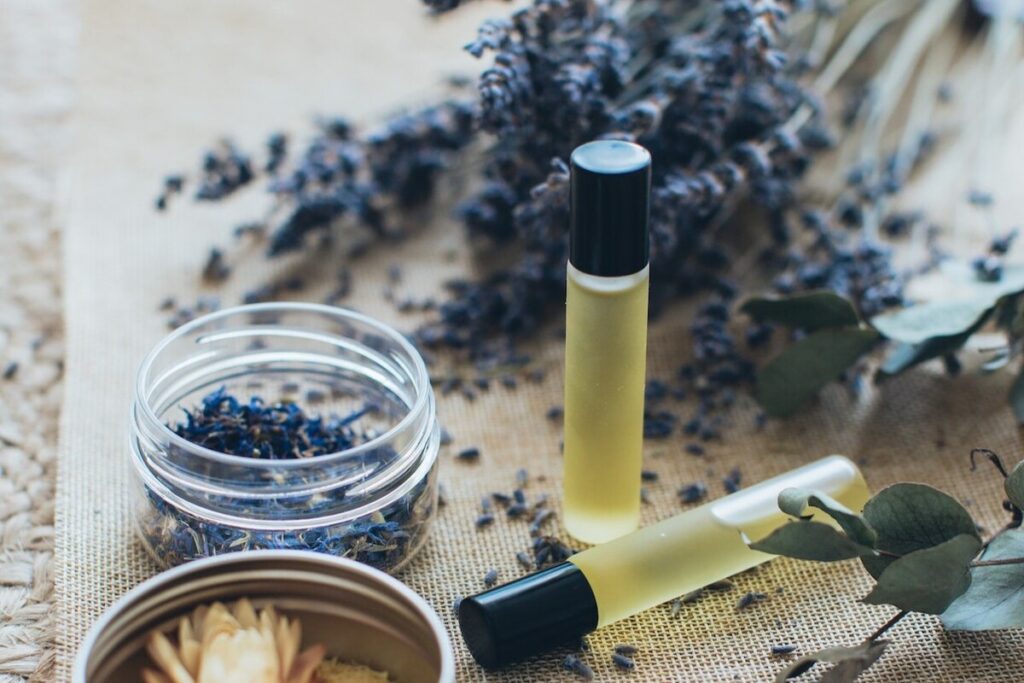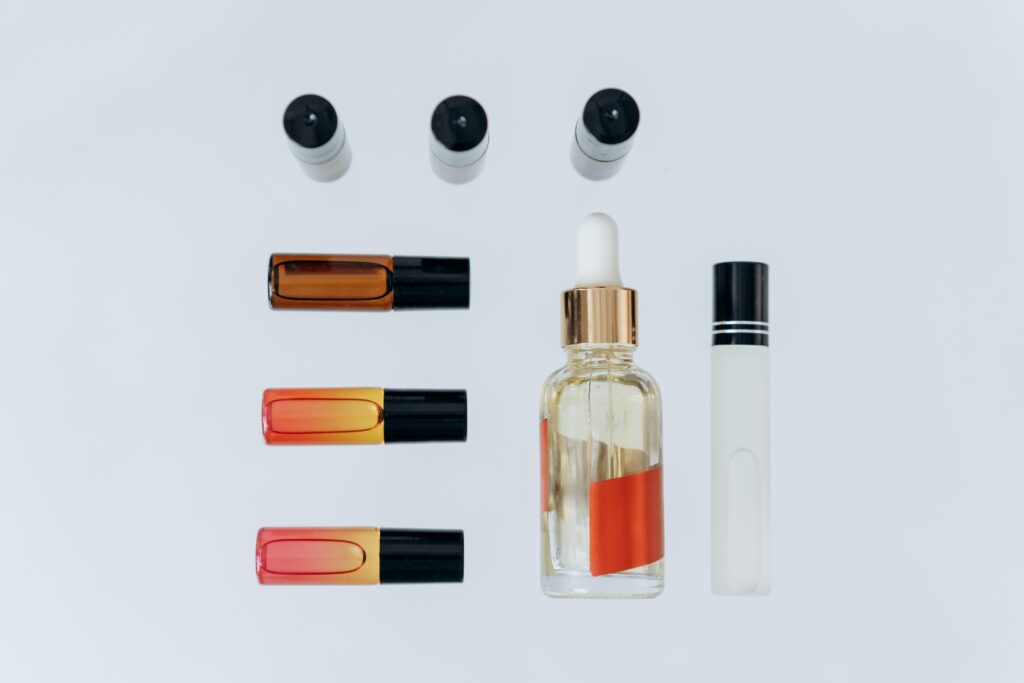Essential oils offer a natural way to combat inflammation. These botanical extracts are celebrated for their powerful anti-inflammatory properties, providing a gentle yet effective method to manage this critical yet complex bodily response.
In this article

Exploring essential oils isn’t just about choosing a nice scent. It’s about understanding their benefits, using them safely, and integrating them into a holistic health approach. Read on to discover how these gifts from nature can be your allies against inflammation.
Why use essential oils for inflammation?
Essential oils have emerged as a popular natural remedy for managing inflammation. Their potent anti-inflammatory properties make them a valuable addition to holistic wellness practices.
Here’s why using essential oils for inflammation is a beneficial choice:
1. Natural Anti-inflammatory Power
Essential oils contain bioactive compounds that possess anti-inflammatory properties. For example, studies have shown that essential oils like thyme, clove, rose, eucalyptus, fennel, and bergamot have anti-inflammatory properties (1). These oils can help to reduce inflammation by inhibiting pro-inflammatory molecules in the body.
Herbal essential oils, in particular, are believed to regulate the release of inflammatory cytokines involved in various signaling pathways, thus helping to reduce inflammation (2).
2. Targeted Relief
Essential oils can be applied topically to target specific areas of inflammation. For instance, massaging diluted peppermint oil onto sore muscles can help alleviate inflammation and ease discomfort. The localized application allows for targeted relief, addressing the root cause of inflammation.
3. Minimal Side Effects
Compared to conventional medications, essential oils typically have fewer side effects. When used properly and in appropriate dilutions, they pose a lower risk of adverse reactions. However, it’s important to note that some essential oils may cause skin irritation or sensitivity, so a patch test is recommended before widespread use.
4. Complementary Approach
Essential oils can complement other anti-inflammatory strategies, such as a healthy diet and regular exercise. Incorporating essential oils into a holistic wellness routine can enhance the overall anti-inflammatory effects and provide a well-rounded approach to managing inflammation.
5. Personalized Aromatherapy
In addition to their anti-inflammatory properties, essential oils offer the benefits of aromatherapy. The inhalation of aromatic molecules from essential oils can stimulate relaxation and support emotional well-being. This personalized and soothing experience can contribute to overall stress reduction, which is essential for managing chronic inflammation.
15 Essential Oils For Inflammation

Here are the top 15 essential oils known for their potential anti-inflammatory properties:
- Lavender Essential Oil
- Peppermint Essential Oil
- Frankincense Essential Oil
- Eucalyptus Essential Oil
- Tea Tree Essential Oil
- Chamomile Essential Oil
- Rosemary Essential Oil
- Helichrysum Essential Oil
- Ginger Essential Oil
- Bergamot Essential Oil
- Cypress Essential Oil
- Patchouli Essential Oil
- Juniper Berry Essential Oil
- Ylang Ylang Essential Oil
- Geranium Essential Oil
How to use essential oils for inflammation
Considering that inflammation can affect the entire body, the method you choose may vary depending on the specific issue you want to address. For instance, the approach for using essential oils for eye inflammation would differ from the optimal method for joint pain.
Here are several techniques for using essential oils to combat inflammation:
1. Bathing
Soaking in a hot bath can be beneficial for sore joints and stiff muscles. By adding the appropriate essential oil to your bathwater, you can enhance the experience and enjoy the unique health benefits provided by each oil.
2. Compresses
If you are seeking an essential oil treatment for eye inflammation, a compress can be effective. By adding a few drops of oil to a fabric compress, you may experience relief from pain and swelling, potentially accelerating your recovery.
3. Diffusion
Using a diffuser is an excellent option for enjoying the benefits of essential oils. It allows the oil particles to disperse into the air, enabling easier absorption of the compounds that aid in combating various ailments.
4. Inhalation
To quickly experience the effects of the chosen essential oil for inflammation, you can smell it directly from the bottle. However, ensure that the concentrated oil does not come into contact with your skin.
5. Massage
If you have determined the appropriate essential oil for your specific inflammation needs, you can dilute it with a carrier oil and massage it into the affected area. This technique may help alleviate pain and reduce swelling, promoting a faster recovery.
Safety guidelines for using essential oils
When using essential oils for inflammation, it’s important to keep the following safety guidelines in mind:
- Dilution: Always dilute essential oils with a suitable carrier oil, such as coconut oil or almond oil, before applying them to the skin. This helps prevent skin irritation or sensitization. The recommended dilution ratio is typically 2-3 drops of essential oil per teaspoon of carrier oil.
- Patch Test: Before applying an essential oil topically, perform a patch test by applying a small diluted amount on a small area of the skin and observing for any adverse reactions or allergies. Apply a small amount of the mixture to the inside of your arm and wait for 24 hours. Discontinue use if irritation occurs.
- Quality and Purity: Choose high-quality essential oils from reputable brands to ensure purity and effectiveness. Look for oils that are labeled as 100% pure and undergo third-party testing for quality control.
- Sensitivities and Allergies: Be aware of personal sensitivities or allergies to specific essential oils. If you have a known allergy to a certain plant or have sensitive skin, it’s best to avoid using essential oils derived from that plant.
- Pregnancy and Medical Conditions: Consult with a healthcare professional, especially if you are pregnant, breastfeeding, have underlying medical conditions, or are taking any medications. Certain essential oils may not be safe or suitable for specific individuals or situations.
- Inhalation Safety: When using essential oils through inhalation methods such as diffusers or steam inhalation, ensure proper ventilation and follow the manufacturer’s instructions. Use caution with concentrated inhalation methods and limit exposure time to prevent respiratory irritation.
- Storage: Keep essential oils stored in dark glass bottles in a cool, dry place, away from direct sunlight and heat. This helps maintain their potency and extends their shelf life.
Frequently asked questions (FAQ)
Got more questions about essential oils for inflammation? Check out some commonly asked questions about this topic below.
What are some of the best essential oils for inflammation?
Some of the top-rated essential oils for inflammation include lavender, frankincense, eucalyptus, and peppermint. Each of these oils carries unique properties that can help soothe inflammation.
How should I use essential oils for inflammation?
Essential oils can be used in various ways for inflammation. Topical application is common but should always be done with a carrier oil to dilute the essential oil. Another method is through aromatherapy, where the oils are inhaled using a diffuser.
Can essential oils replace traditional anti-inflammatory medications?
While essential oils can provide relief from inflammation, they shouldn’t be seen as a replacement for traditional medication without consulting a health professional. They are complementary therapy and can be part of a comprehensive approach to managing inflammation.
Final Word
Essential oils provide us with an opportunity to embrace a more holistic approach to health. So, whether you’re drawn to the calming scent of lavender or the invigorating aroma of peppermint, remember that these gifts from nature can be your allies against inflammation. Do remember, though, essential oils are part of a comprehensive health approach and should not replace traditional medication without professional advice.
If you’ve found value in these insights, why not spread the word? Share this article with a friend who might benefit from it. And for more enlightening tips on integrating natural remedies into your lifestyle, feel free to explore the rest of my blog.
Resource(s)
- Hotta M, Nakata R, Katsukawa M, Hori K, Takahashi S, Inoue H. Carvacrol, a component of thyme oil, activates PPARalpha and gamma and suppresses COX-2 expression. J Lipid Res. 2010 Jan;51(1):132-9. doi: 10.1194/jlr.M900255-JLR200. PMID: 19578162; PMCID: PMC2789773.
- Zuo X, Gu Y, Wang C, Zhang J, Zhang J, Wang G, Wang F. A Systematic Review of the Anti-Inflammatory and Immunomodulatory Properties of 16 Essential Oils of Herbs. Evid Based Complement Alternat Med. 2020 Dec 7;2020:8878927. doi: 10.1155/2020/8878927. PMID: 33354224; PMCID: PMC7735857.
